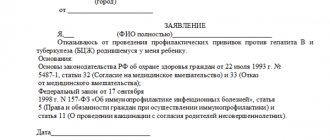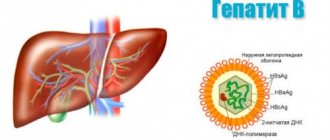What vaccinations are given to newborns in the maternity hospital?
All parents are concerned about the question of what vaccinations are given to newborns? Doctors necessarily take tests, conduct a visual examination of the baby and, based on the data, prescribe vaccination. This is an effective way to develop immunity in a child, especially if there are signs of predisposition to the development of a particular disease. 2 days after birth, a BCG injection (for tuberculosis) is required.
Vaccinations against hepatitis B at birth in the maternity hospital are also included in the vaccination list, but parents have the opportunity to refuse this procedure. To do this, you should write a written statement and notify the staff of your decision. Employees are obliged, if possible, to persuade parents to get vaccinated, but they do not have the right to force them. Before filing a refusal, carefully weigh the pros and cons.
Newborn vaccination schedule
Parents should prepare to vaccinate their child even before birth. The preparation includes a discussion of the need for the procedure, as well as, in case of a positive decision, a study of the schedule for its implementation.
The first vaccinations for a baby are given immediately after birth in the maternity hospital:
- Hepatitis B. Is the first in a baby’s life. It is usually done within 24 hours after birth.
- Tuberculosis (BCG). The vaccination is carried out during the first week of life.
After discharge from the hospital, the list of upcoming vaccinations is presented as follows:
- The second injection for hepatitis B is given when the baby is 1 month old.
- Vaccination against whooping cough, tetanus, diphtheria and polio - at the age of 3 months.
- Repeating the previous procedure – 5 months.
- The third injection for hepatitis, polio and DTP - when the child reaches the age of 6 months.
When a baby turns 1 year old, he should be vaccinated against measles, rubella and mumps.
Is hepatitis B vaccination mandatory for newborns?
The hepatitis B vaccine is not mandatory, which raises doubts among parents about its need. No one will forbid you to refuse this procedure, but before doing so, you should take into account the risk factor that arises during the development of the disease. You need to get vaccinated for the following reasons:
The disease has become widespread; some experts compare it to an epidemic that can only be prevented by vaccinating a child in the maternity hospital. When hepatitis B becomes chronic, complications may develop that lead to disability or death: liver cirrhosis, cancer. If the disease manifests itself in an infant, then without treatment he becomes chronic. Vaccination does not provide 100% protection against hepatitis B infection, but the likelihood is significantly reduced. When a vaccinated child becomes infected, the disease is much milder, recovery occurs faster and without consequences for the baby.
Some parents think that newborns do not need a hepatitis vaccine, there is no place for them to become infected, and there is no need to subject the body to the procedure of introducing the virus. This is a misconception, because in various situations, young children may inadvertently come into contact with someone else's blood, which is infected with hepatitis B. The child may fight, be bitten or hit, and the virus will enter through the wound. If a nurse forgets to change gloves when taking a urine test, infection will occur and the disease can be transmitted through the genitourinary system. Vaccination will be the first “shield” against the risk of infection.
Vaccination against hepatitis B for newborns in the maternity hospital, the body’s reaction
Hepatitis B is a serious viral disease that is difficult to combat. With it, the liver and gall bladder with ducts are severely affected. You can become infected with such hepatitis not only through sexual contact, but also through everyday contact.
This disease can cause a number of serious complications, including cirrhosis and liver cancer. And they, in turn, lead to rapid death.
More than half of children under five years of age whose bodies have been infected by the virus become chronically ill. And for a one-year-old infected baby, the chronic form is guaranteed one hundred percent. To protect your baby from an unfortunate fate, you should be vaccinated against a dangerous disease.
To avoid long-term, serious treatment and severe complications, vaccination is carried out to prevent infection in all countries of the world.
Vaccination of children against hepatitis B
Scientists from the World Health Organization recommend vaccination against hepatitis B while still in the maternity hospital. This is not a mandatory action, but a recommendation, and many mothers and fathers are overcome by doubts about its appropriateness. Some, due to lack of awareness, oppose it, putting their child’s life at risk.
A child can become infected with a dangerous virus in a variety of situations: after getting into a fight with another child in kindergarten, picking up an infected syringe on the street, or when taking blood for a test.
Only vaccination against infection can protect against infection.
Why is it recommended to do it for a newborn? This is due to the fact that infection of a newly born baby is always fraught with serious complications due to the body’s fragile defense system. Moreover, not all expectant mothers can be sure that they are clean from the virus - often hepatitis B is asymptomatic. And a newborn may already be infected with a dangerous infection in the first days.
Vaccination against hepatitis B is not an absolute guarantee against infection. But if a vaccinated baby catches the infection (although this possibility is very small), he will have a mild illness, without complications, and will recover very quickly.
There is also a risk group of newborns for whom vaccination is absolutely indicated:
- The baby's mother is a carrier of the virus. It is especially dangerous if the infection occurred from 24 to 36 weeks after conception.
- The pregnant woman has not been tested for this disease.
- The baby's parents are drug addicts.
- Someone close to the child has hepatitis.
We suggest you read: When to take tests for female hormones and how to do it correctly?
In these cases, the possibility of infection increases tenfold. You shouldn’t refuse medical help and risk your baby’s health.
Moreover, modern vaccines are safe, and infants react to them without incident, the vaccination is well tolerated, and the side effects are negligible and easily manageable. This is achieved by precise dosage, the absence of preservatives and active pathogens.
Currently, six registered brands of vaccines against this strain are approved for use in Russia. They are equally safe and differ only in the country of origin and cost (for paid vaccination). Some are offered for free mass vaccination, some are used in private medical centers.
It is allowed to vaccinate a newborn against a dangerous virus:
- yeast recombinant vaccine (Russia);
- polyvaccine Bubo-kok (Russia). It will protect not only from hepatitis B, but also works against diphtheria, whooping cough, and also tetanus;
- the drug Engerix-B (Belgium);
- using Eberbiovak NV (Russia-Cuba);
- vaccine H-B-VAX II (USA);
- using Sci-B-Vac (Israel).
In all maternity hospitals in Russia, immediately after the baby is born, his mother will be asked to sign a consent to the vaccination procedure. If the decision is positive, the child will be vaccinated on the same or the next day. A virtually painless injection will be given in the upper thigh, where the baby’s muscle tissue is sufficiently developed.
Vaccination will be most effective if it is given to a newborn and all stages of the procedure are strictly followed.
Currently, doctors offer three vaccination schemes for children:
- Standard option. The first injection is given almost immediately after birth, the next one a month later, and the last one six months later. This scheme is considered the most successful.
- For accelerated development of immunity. First, the baby is vaccinated in the maternity hospital, the next stage is a month later, then two months later. The last vaccination is done after a year. Such a scheme is necessary to better protect children at risk.
- Emergency vaccination. It is usually performed on newborns who require surgery. Such a child receives the first dose of the vaccine at birth, the next dose seven days later, the third dose after 21 days, and the last dose after a year.
Such multiple vaccination regimens against hepatitis B are needed to create stable immunity to the dangerous virus.
Protection from one injection will not last long. If parents did not want to get vaccinated in the maternity hospital, but subsequently decided to undergo the procedure, then the local pediatrician will suggest the correct scheme.
This also applies to those cases if for some reason it was not possible to carry out the third revaccination. If the second stage of grafting is missed, the process will have to start again. Many parents are interested in whether it is possible to vaccinate with one drug at the first stage, and with others at the next stage. Doctors believe that it is possible, because the drugs are interchangeable. But it is better to stick to one brand.
If the vaccination schedule was followed exactly, then the child is protected from a dangerous disease for as long as 22 years.
Most newborns tolerate vaccination without consequences. But occasionally there are side effects that you need to be aware of.
- An allergic reaction to the components of the vaccine in the form of redness, itching, and the appearance of a lump in the injection area. This is harmless and will go away in just a few days. A similar effect can be caused by getting the injection site wet. In rare cases, the baby may react to the vaccine with an increase in temperature, which will also quickly subside under the supervision of doctors.
- Slight weakness, headache and the baby’s capriciousness associated with these ailments.
- Excessive sweating.
- Stomach upset.
Similar effects of vaccination disappear in the first two days after the injection. Complications also occur, but they are extremely rare (according to statistics, one case per hundred thousand).
These include:
- urticaria and allergic rashes;
- erythema nodosum;
- severe allergy with anaphylactic shock.
But since the first stage of vaccination takes place in the maternity hospital under the supervision of doctors, even in these cases the baby’s life is not in danger. There are certain limitations to vaccination against hepatitis B.
- Mom’s intolerance to baker’s yeast, that is, an allergy to bread, baked goods, beer drinks, kvass.
- Inadequate reaction to the first injections.
- Exacerbation of diathesis or some infectious disease, for example, ARVI. In this case, the child is vaccinated in the remission phase.
- Meningitis (vaccination is carried out six months after treatment).
- Autoimmune diseases and primary immunodeficiency.
- Low baby weight (less than two kilograms).
By the way, jaundice of newborns is not a contraindication for vaccination against this strain.
Usually parents are offered a vaccine purchased by a medical institution. They can read the annotations, consult with doctors, and if they do not consider this drug suitable, choose another option. But it will already be paid. It is recommended that the mother be present at the vaccination and make sure that all instruments are disposable.
Which hepatitis B vaccine is used?
There are currently two types of hepatitis B vaccinations in use: a combination vaccine, which contains additional components that protect against other infections, and a monovaccine, which includes only one virus of the disease. The following vaccine options for newborns are used:
Russia produces a recombinant yeast vaccine; Bubo-Kok - Russian combined vaccination against whooping cough, hepatitis, tetanus, diphtheria; Bubo-M - differs from the option above in the absence of a whooping cough vaccine; Regevak (Russia) – recombinant yeast liquid for intramuscular administration; Eberbiovak (Cuba) – recombinant yeast vaccine; Euvax B (South Korea); HB-Vax II (USA); Shanvak (India); Engerix B (Belgium); Biovac (India).
Reasons for refusing vaccinations
The main reasons for refusing to vaccinate an infant are:
- Birth before the due date and low weight of the baby (important for vaccination against tuberculosis);
- Allergic reactions (hepatitis B vaccination);
- Congenital immunodeficiency syndrome;
- Complications after the first vaccinations;
- Nervous system disorders;
- Exacerbation of infectious and chronic diseases.
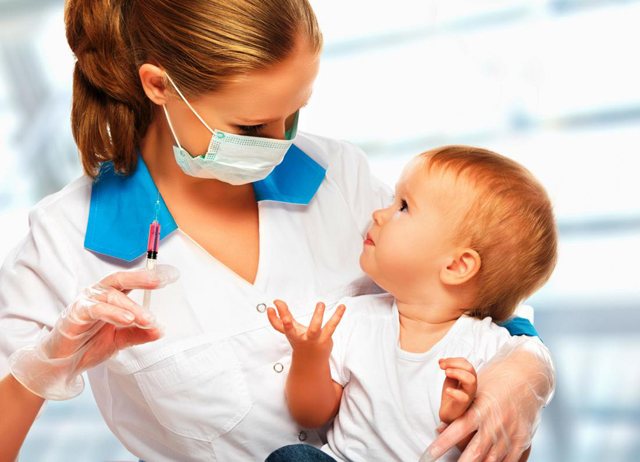
Required conditions:
- Preliminary examination of the baby and testing;
- Health of the whole family;
- Prohibited during transfer to another type of food;
- Not recommended at the time of teething;
- In case of recent recovery, the procedure should be postponed for several weeks;
- With the agreement of the doctor, for children with allergies, antihistamines should be given 2-3 days before vaccination;
- After the injection, you need to wait half an hour to avoid adverse reactions;
- It is not recommended to bathe your baby before going to the hospital.
In addition, after the injection you should not take walks, especially in crowded places.
Where are newborns vaccinated against hepatitis?
The child is given an injection intramuscularly, which ensures that the antigen enters the blood and creates the necessary immune response. If the vaccination is performed subcutaneously, the effectiveness is greatly reduced and tissue compaction occurs. Previously, an injection into the gluteal muscle was performed, but this practice was abandoned. Such manipulation could lead to injury to blood vessels and nerves, and the fat layer retained part of the injection contents. For newborns and children under 3 years of age, the vaccine is given in the thigh, and for adolescents - in the shoulder. It is necessary to avoid getting moisture at the injection site for 3 days.
What reaction to a hepatitis vaccine in an infant is considered normal?
As a rule, vaccination against hepatitis in newborns does not cause any complications other than a local reaction. The following side effects may occur in an infant:
Lumps at the injection site, redness, discomfort. This indicates an allergy to aluminum hydroxide, which is contained in the drug. Happens in 10-20% of children vaccinated. These symptoms often appear when moisture gets into the injection site; such a reaction does not pose any danger. A small number of children (up to 5%) experience an increase in temperature, which is easily reduced by any antipyretic drug. Should be used only after consultation with a doctor. General malaise and weakness may occur. The child may cry throughout the day due to a headache. The body may respond to vaccination in the form of diarrhea and excessive sweating.
All these manifestations are considered normal for babies who have been vaccinated against hepatitis B for 1 month or a year. Symptoms can persist for up to 3 days, after which they disappear without a trace and on their own, after the specified period. It is extremely rare that serious complications are diagnosed as a consequence of vaccination. During vaccination of newborns, they are under the supervision of maternity hospital doctors.
Vaccination of children against hepatitis B: schedule and possible complications
In our country, hepatitis vaccination is included in the National Calendar and has several administration regimens: traditional and vaccination for accelerated protection. The first includes several stages:
- in the first few hours after birth, the baby is given the first vaccination;
- after a month, the second injection of the vaccine occurs;
- When six months have passed after the first dose of the vaccine, the last 3 vaccinations are given.
These deadlines are approved by the Ministry of Health, and all experts recommend adhering to exactly this schedule.
The most important thing that parents or legal representatives of the child should remember is that no more than 3 months should pass between the 1st and 2nd vaccination, and the third dose of the vaccine should not be given later than 1.5 years after the first. These 3 vaccinations protect the body for a very long time, so revaccinations are not carried out.
The second scheme for vaccinating children against the virus is as follows:
- on the first day after birth, babies receive their first vaccination;
- after a month they make a second one;
- when children turn 2 months old, the 3rd dose is administered;
- after a year, another one is placed.
Why do we need an accelerated vaccination schedule for children against hepatitis B? Children born from infected mothers, or those babies who have had contact with infected people, are at risk, so they must receive a course of vaccinations against this disease.
Many mothers are concerned about possible complications after the vaccine is administered. Due to ignorance, parents immediately write a refusal to vaccinate their child in the maternity hospital, but if the vaccine is good and the procedure itself is carried out according to all the rules, then there will be no serious complications. Sometimes some babies may experience weakness, increased drowsiness, headache or flushing. But they pass quickly.
Since modern vaccines are of much higher quality than before, adverse reactions are very rare. More often there is not pronounced pain at the injection site, fever or allergies. But even a good vaccine has its contraindications: the presence of allergic reactions to the components of the vaccine, anemia, lack of weight, high fever, colds and poor condition of the child.
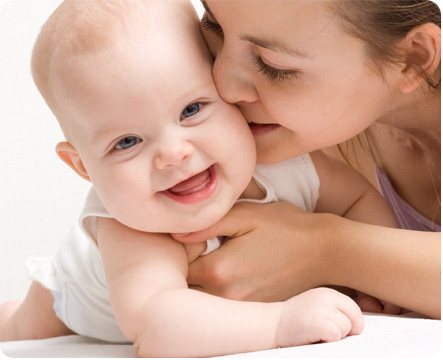
Possible complications and consequences after vaccination
Side effects and complications are recorded 1 time in 100,000. Such consequences on the effect of the vaccine are extremely rare, the most common manifestations are:
rash; hives; anaphylactic shock; erythema nodosum; exacerbation of allergies.
Manufacturers around the world are constantly working to improve the vaccine, trying to reduce the dosage, and eliminating preservatives. This helps minimize the risk of complications in newborns. WHO studies confirm that the composition of the hepatitis B vaccine does not contain anything dangerous and does not in any way contribute to the further development of multiple sclerosis. The vast majority of complications occur due to non-compliance with contraindications.
Possible complications
In 1 case per 100 thousand, the following complications are diagnosed after vaccination:
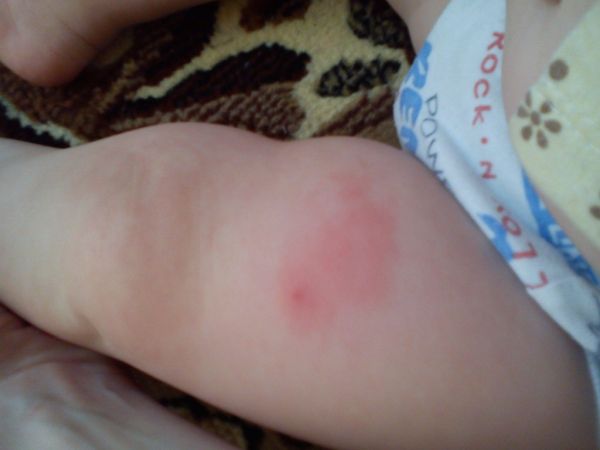
- hives and skin rashes;
- anaphylactic shock;
- erythema nodosum;
- worsening allergic manifestations.
Modern vaccine manufacturers lower doses and abandon the use of preservatives, which minimizes all negative symptoms and complications. Vaccinations contain 3 main active ingredients:
- Australian antigen - a protein of the infectious agent that does not contain additional substances;
- aluminum hydroxide;
- a preservative that helps maintain the activity of the product.
Injection preparations do not contain harmful components. There is an opinion in society that vaccinations against hepatitis B stimulate the development of various serious pathologies, including multiple sclerosis. In reality, these rumors have no evidence.
Laboratory studies have shown that the vaccine does not affect the neurological processes occurring in the body. The opinion about the danger of the procedure is greatly exaggerated, so you should not blindly trust it and refuse the procedure. Complications often occur when contraindications are not followed, but specialists carefully monitor this.
Whether or not to get vaccinated against hepatitis in the maternity hospital is a personal matter for each parent. It is important to carefully consider your decision, study information about vaccinations, and consult with a specialist.
Immunoprophylaxis is carried out only on a voluntary basis, so you can refuse it at any time. However, we should not forget that hepatitis in newborns often develops without symptoms, and then becomes protracted, which complicates therapy.
Before the birth of a long-awaited baby, an increasing number of parents began to think about the issue of vaccinations in the maternity hospital (pros and cons). Currently, in accordance with the Russian vaccination calendar, children in the maternity hospital are vaccinated against hepatitis B (in the first day after birth) and against tuberculosis - BCG (on days 3-7). Of course, before giving a child vaccinations in the maternity hospital, it is necessary to understand how safe they are and to what extent they are useful for the baby.

Reviews
Olga, 28 years old
After giving birth, doctors recommended getting vaccinated against tuberculosis and hepatitis B. I didn’t write a refusal and I don’t regret it at all. The child tolerated the vaccination well, there were no side effects. Maybe the probability of catching the disease is very low, but I don’t want to check. We used the drug Engerix on the recommendation of a familiar couple with children. This is a good foreign vaccine.
Elena, 32 years old
I am already having my second child, and I think that newborns do not need this vaccination (against hepatitis B). I vaccinated the first one (a boy) at the age of 6, and I plan to vaccinate the second one (a girl) at the same time. Friends said that after the vaccination, jaundice appeared, which was attributed to “newborn jaundice,” but a close friend (also a doctor) claims that this is one of the “side effects” of the vaccine.
Olga, 22 years old
I thought for a long time during pregnancy about the need to vaccinate my newborn against hepatitis B and decided to play it safe. The first injection was given right in the maternity hospital, the child endured everything very calmly and without complications. We used the Belgian drug Engerix. I don’t know what the real probability of contracting the disease is, but it’s better to avoid even the slightest possibility.
As you know, vaccination against hepatitis for newborns is included in the compulsory vaccination calendar. Thus, the first two vaccinations are administered in the maternity hospital: tuberculosis vaccine and hepatitis B vaccine for newborns. According to the preventive vaccination schedule, a newborn child is injected with the vaccine within 12 hours after birth. As a result, a number of related questions arise, because in the first hours of life it is not always possible to notice possible deviations in vital signs.
Complications after immunization
As mentioned, hepatitis B is a serious disease that is spreading rapidly. For this reason, doctors have compiled 3 immunization schedules for different occasions:
- Standard scheme. According to this schedule, the first hepatitis vaccination is given in the maternity hospital, the second when the child reaches 1 month, and the last when he reaches six months of age. This vaccination regimen is considered the most effective.
- Fast. The first immunization is carried out within 24 hours after birth, followed by hepatitis vaccination at 1 month, then at 2 months and 1 year. This schedule guarantees the immediate development of immunity, so it is used for patients at risk.
- Emergency immunization. The drug is administered to the baby for the first time within 24 hours after birth, the second time after 1 week, the third time after 3 weeks, the fourth time after 1 year. As a rule, this immunization regimen is used before emergency surgery. It helps to quickly develop specific immunity to HBV.
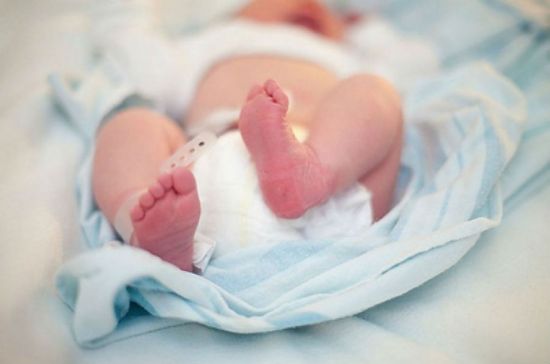
The first hepatitis B vaccine is recommended immediately after birth.
Parents are interested in the question of what schedule to follow if the injection was not given after birth. Then the timing of the first vaccination is chosen by the pediatrician and parents individually for each child, after which it is necessary to choose one of the above schemes. If you missed the second stage of immunization, and the next injection was not given within 5 months, then the schedule begins again. If you missed the third injection, then use the 0 - 2 scheme.
After the first injection, immunity is temporary. To form long-term immunity, the injection must be given 3 times.
Immunization at home is strictly contraindicated. The child is vaccinated only in special rooms of medical institutions. Before the procedure, the patient is examined, and after it the baby must be under the supervision of a doctor for 30 minutes.
The question of how long immunity lasts after vaccination is quite relevant. If all injections were given according to the schedule, then the patient is protected from hepatitis for 22 years.
TEST: What is the condition of your liver? Take this test and find out if you have liver problems.
Start test
The hepatitis vaccination schedule depends on how quickly specific protection needs to be developed. If he is predisposed to infection, then doctors use an emergency regimen:
- Vaccination against hepatitis B for newborns is carried out if the mother is a carrier of HBV.
- If the mother became infected with hepatitis from the 24th to the 36th week of gestation, then immunization is also necessary.
- If the mother has not been tested for hepatitis, then the child also needs protection.
- If a pregnant woman and her husband use injecting drugs.
- Immunization is necessary if HBV is detected in the body of close relatives of the mother.
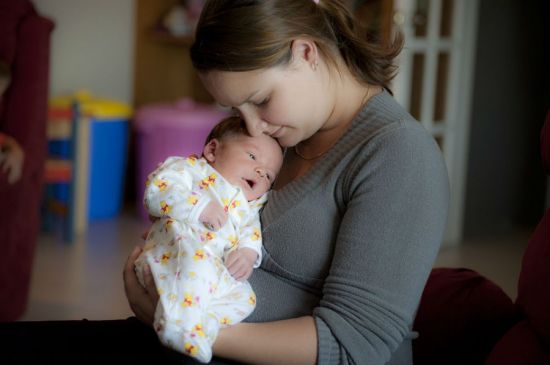
If the mother is a carrier of HBV, the child needs urgent vaccination
In all of the above cases, children need vaccination, otherwise the risk of infection increases.
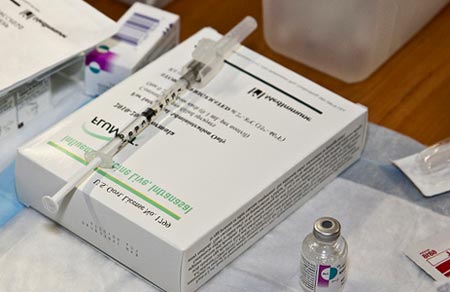
Parents often refuse vaccinations because they are worried about the baby’s condition during the post-vaccination period. However, doctors assure that there is nothing to be afraid of, since newborns tolerate the immunobiological drug normally. In addition, their condition is monitored by medical workers.
Vaccination causes complications in 1 patient out of 100,000.
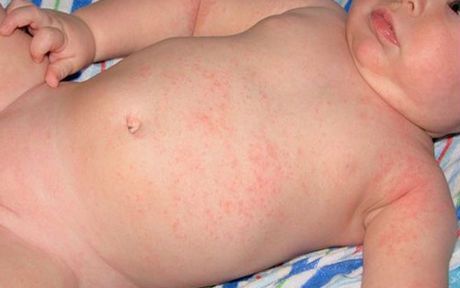
We invite you to read: What does free fluid in the pelvis mean: causes, signs and treatment
Urticaria is one of the complications after vaccination
Vaccination against hepatitis B can cause the following negative reactions:
- nettle fever;
- rash on the skin;
- erythema nodosum;
- anaphylaxis (swelling, choking, muscle spasms and severe pain).
Most often, complications are caused by additional components of the drug. Modern vaccines contain few preservatives, so babies are less likely to experience side effects.
The hepatitis vaccine contains 3 main substances:
- Australian antigen (components of the HBV protein coat, purified);
- aluminum hydroxide;
- merthiolate (a preservative that preserves the activity of the drug).
According to doctors, the vaccine does not contain dangerous substances, so it cannot cause severe pathologies (for example, multiple sclerosis).
According to medical studies, an immunobiological drug for protection against HBV does not provoke neurological disorders. Therefore, you should not believe myths about the dangerous effects of this vaccine and refuse immunization. Complications arise only if the patient has contraindications, but doctors check the patient for their presence before vaccination.
General information about hepatitis
Hepatitis B is a disease of viral etiology, caused by a pathogen with characteristic hepatotropic qualities. The mode of transmission is blood and body fluids. Viral hepatitis leads to degenerative processes in the liver tissues and subsequently provokes cirrhosis or cancer. It is highly resistant to environmental influences. It is practically not destroyed in the processes of freezing, boiling, in an acidic environment, at low and high temperatures. Symptoms of the disease:
nausea; vomiting; weakness; darkening of urine; light-colored stool; yellowing of the whites of the eyes and skin; low-grade fever.
Vaccination for your baby: is it worth it?
Jaundice in newborns may be a reaction of the body to the vaccine.
Vaccination of infants makes it possible to reduce the risk of infection with viral hepatitis due to contact with carriers of the infection. But is everything so harmless? The vaccine that forms the immune response against hepatitis B is young, and therefore could not have been well studied over generations. There are ongoing discussions about the connection between vaccinations and disorders in the functions of the immune system - autoimmune diseases. One of the reactions to hepatitis vaccination in a newborn may be a jaundiced condition, which may be similar to physiological jaundice, but in a more complex form. For many reasons, more and more parents are becoming vaccine-conscious, advocating for and against the procedure.
Risks of infection in a newborn
Due to the fact that a newborn is vaccinated in the first hours after birth, immunity against hepatitis begins to form almost immediately. Despite many contradictions, there are a number of risks that justify vaccination of infants:
the risk of infection of a newborn child from a mother who is a carrier of the virus; carrying out a blood transfusion procedure; the presence of a hepatitis B carrier in the family; if medical procedures are necessary; if surgical intervention is necessary.
What type of hepatitis is the baby vaccinated against?
The vaccine should protect against hepatitis B.
Why are infants vaccinated specifically against the hepatitis B virus, since there are several types of hepatitis? Currently, this disease is the most common form of hepatitis, the number of infections with which is constantly growing. The virus is transmitted through blood from a carrier and may not manifest itself for a long period, especially in young children. The incubation period takes a long time before the disease makes itself felt. Therefore, in order to protect the baby’s life, they are vaccinated against hepatitis in the first days and months of life. Hepatitis vaccination has been included in the compulsory vaccination schedule by the World Health Organization.
Contraindications
The responsibility of parents is to monitor the child’s condition and warn the doctor about possible deviations in order to avoid negative post-vaccination complications. Contraindications to vaccination are:
skin rash in the form of diathesis; ARVI, colds and other infections; meningitis (vaccinated no earlier than six months after the illness); allergy to products containing yeast; autoimmune diseases; negative reaction to a previous vaccination.
Hepatitis vaccination
Parents often wonder what type of hepatitis they vaccinate against in the maternity hospital? hepatitis B virus vaccine.
Vaccination against hepatitis in the maternity hospital is given during the 12-hour period of infant life. This disease is dangerous because it affects the nervous and digestive systems.
The hepatitis vaccine is administered for the following reasons:
- Hepatitis affects the liver , which performs a cleansing function. From the first minutes of life, the organ ensures the formation of bilirubin as a result of the destruction of maternal red blood cells.
- The liver is involved in the process of first nutrition and digestion.
- The organ is responsible for hormonal production for the absorption of food.
- The disease has a destructive effect on the gallbladder and ducts.
- The disease is characterized by a hidden nature of its course.
- The disease is characterized by a long incubation period (can reach 12 weeks).
- The hepatitis virus is characterized by rapid spread and relative resistance to external factors, which causes mass infection.
Since a newborn is at risk, vaccination against hepatitis in the maternity hospital is carried out during the first day of his life. It is recommended to administer the vaccine intramuscularly into the anterior outer thigh. For the procedure, domestic and foreign (Belgium, USA, Israel) raw materials are used. The material is purified. As a result, allergic reactions occur extremely rarely. may rise slightly.
The indications for whether to vaccinate against hepatitis B in the maternity hospital are:
- lack of research into the health of the expectant mother for this disease;
- detection of the virus in the expectant mother;
- presence of drug addiction in the child’s parents.
There are several methods of grafting:
- standard scheme: the vaccine is administered immediately after birth, after a month and after six months;
- scheme for accelerated immunoproduction: the first vaccination is given after birth, the second and third - at a monthly interval in relation to each other; the last procedure – after 12 months; recommended for children at risk;
- emergency vaccination scheme: vaccination is carried out at the moment of birth, after one and three weeks; the last stage – in a year; relevant for children whose condition requires surgical intervention;
Mother's consent is required for vaccination .
For this purpose, a supporting document is filled out in two copies. If parents are against vaccination, the medical staff must be warned about this in advance. It is important to remember that a single vaccination does not have a long-term effect. If it was missed in the maternity hospital, the vaccination schedule is prescribed by the local pediatrician. If the next procedure is skipped, then vaccination begins from the very beginning.
Vaccines from different manufacturers can be used for vaccinations. This is due to the interchangeability of materials. However, it is recommended to introduce a product from one company. To clarify the information, medical record data is used.
Contraindications to vaccination are:
- prematurity of the child (weight below 2 kg);
- low Apgar score;
- diagnosing a child with hepatitis received from the mother;
- acute illness;
- meningitis;
- damage to the skin with the presence of diseases of purulent-septic manifestations;
- intrauterine infections;
- period of exacerbation of an infectious disease;
- hemolytic anemia;
- pathologies of the central nervous system (CNS);
- autoimmune diseases (including primary immunodeficiency).
side effects may occur
- change in body temperature (increasing);
- increased sweating;
- hyperemia of the skin in the area where the vaccine was administered;
- fatigue;
- pain in joints and muscles;
- allergic reactions (up to anaphylactic shock ).
Correctly carried out vaccination guarantees protection of the child’s body from hepatitis B for a 15-22 year period.
Hepatitis B vaccination schedule for newborns
There are 3 main schemes according to which children are vaccinated:
Compliance with the vaccination interval plays a very important role in the formation of immunity.
Standard regimen (included in the hepatitis vaccination schedule for newborns). According to this scheme, a newborn child is vaccinated against hepatitis during the first day of birth, the next dose is given a month later, and the third at 6 months.
For children at risk, the vaccine is administered according to a rapid schedule in order to obtain an urgent immune response from the body. According to this scheme, the vaccine is administered in the maternity hospital, then at 1, 2 and 12 months. Emergency scheme. Most often used before urgent operations. The vaccine is administered to infants at birth, then on the 7th and 21st days of life and at 1 year.
It is important to know that vaccine alone does not provide good immunity to hepatitis. To form long-term immunity, vaccination consists of 3 times with strict adherence to the permissible intervals. If for some reason the first vaccine was not administered in the maternity hospital, the first hepatitis vaccination is given at 1 month or at 3 months with further observance of vaccination intervals. The second vaccine should be administered a month after the first, and the third at the age of 12 months.
Who is prohibited from getting the hepatitis B vaccine?
Vaccination against hepatitis B is prohibited in the following cases:
- Intolerance to baker's yeast. If a child develops an allergy after drinking beer, kvass, or products made from yeast dough, then vaccination is canceled or carried out under the supervision of doctors in a hospital setting.
- Excessive reaction to a previous injection.
- Diathesis. The drug is administered only after the skin rash disappears.
- ARVI, influenza or other acute infections. The vaccine is given only when the patient has fully recovered.
- Meningitis is an inflammation of the lining of the brain and spinal cord. Immunization is carried out only after six months.
- Autoimmune diseases (immune reactions to the body's own tissues): multiple sclerosis, lupus erythematosus, etc.
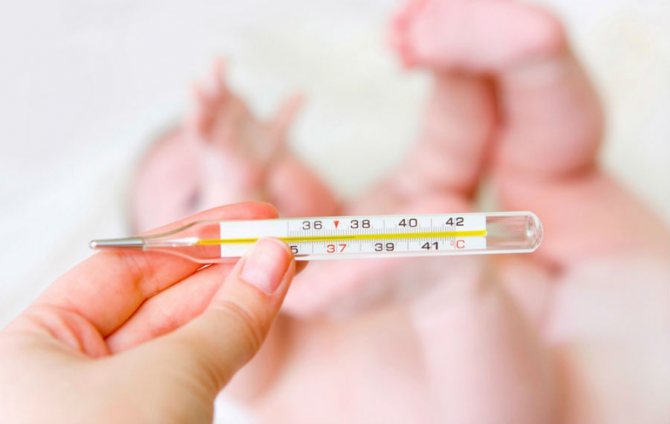
Infectious diseases are a contraindication to vaccination
In addition, the hepatitis B vaccine is not given to infants weighing less than 2 kg.
Is there a reaction to the vaccine?
Children often have a quick reaction to vaccination.
Vaccination is tolerated by newborn children quite easily without any particular complications. A local reaction to the hepatitis vaccine in the form of redness is often observed. Side effects from vaccination can most often manifest themselves in the form of the following symptoms:
redness in the injection area is a response of the body, is of allergic origin to the component of the vaccine - aluminum hydroxide (according to statistics, it is observed in 10-20% of children); slight weakness and sweating; headache, provoking whims for 1-2 days; loose stool; increased body temperature (observed in 1-5% of children); itching at the injection site.
Side effects and consequences of vaccination
In rare cases, babies have a reaction to the vaccine.
WHO studies have proven that vaccination against hepatitis does not lead to neurological pathologies in children and does not intensify existing ones. Numerous myths regarding the dangers of vaccines are not justified and cannot make parents doubt whether to vaccinate their newborn or not. Complications are observed only in cases of ignoring contraindications. The rarest post-vaccination reactions, which are observed with a frequency of 1 in 100,000 vaccinated children, can be:
rash; urticaria; exacerbation of allergic reactions; erythema nodosum; anaphylactic shock.
Hepatitis B vaccination schedule
Vaccination against hepatitis B includes three injections of the vaccine: at 0-1-6 months. This means that the interval between the first and second vaccination should be at least a month. And the interval between the first and third vaccinations is 6 months. If for some reason the intervals between vaccinations lengthen, for example, a child gets sick, vaccination does not need to be started all over again, it should simply be continued.
Previously unvaccinated children are vaccinated according to the same scheme - 0-1-6.
0-1-2-12 scheme , children from the risk group born to mothers who are sick with viral hepatitis B are vaccinated.
Where is the hepatitis B vaccine given?
The vaccine is administered intramuscularly. For children from 0-3 years old, into the upper outer surface of the middle part of the thigh, for older children and adults into the deltoid muscle on the shoulder. The drug is not injected into the buttock, since the gluteal muscle in children is poorly developed, so the vaccine can get into the subcutaneous fat, which will cause inflammation.
Vaccine composition
The debate about the toxic effects of the vaccine is not justified. Today, manufacturers are trying to minimize the dosage of preservatives and are improving the composition in order to minimize the side effects of harmful substances on the body. They are included in minimal, permissible doses. Vaccinations consist of 3 main components:
| Composition component | Properties |
| Purified viral protein - Australian antigen | the vaccine does not contain the whole virus, but only a portion of the outer shell, which does not lead to infection, but only causes an immune response to the disease |
| Merthiolate | preservative |
| Aluminum hydroxide | immune response enhancer |
Consequences of vaccination
According to ongoing research, the effects of hepatitis vaccination in newborns are positive. Even after 10-20 years, antibodies against this disease are found in the blood of adults. In addition, the body retains immune memory for a long period, which ensures immunity to the disease. The negative effects of the vaccine have not been proven. In quite rare cases, the development of autism was observed in vaccinated children, but the direct dependence of the disease on vaccination has not been substantiated.
According to the mandatory vaccination schedule, hepatitis B antigen must be administered on the first day of life. Immunity is formed in the first months of a baby’s life. This further ensures the baby’s protection from infection when visiting childcare facilities and during medical procedures. Recently, many parents have refused vaccinations for their newborns. It is important to realize that the disease is spreading quite actively among the masses, and vaccination is a serious preventive measure in the fight against this disease. Immunization has the main goal of preventing infection with the virus and protecting against severe complications such as liver cirrhosis and hepatocellular cancer. Parents decide whether to vaccinate their baby or not, but at the same time they are responsible for the life and health of their child.
